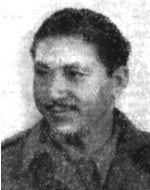Cohen, Uriel (Uri)
The youngest son of David and Moshe, a descendant of an old and blessed family of boys and girls, was born on September 29, 1920 in Jerusalem. In difficult economic conditions, he graduated from elementary school and continued to study for a short time in a high school and then went to work as an electrician. He was a member of Hanoar Haoved and continued his professional and general training. His older brothers were members of kibbutzim throughout the country and the burden of support for parents fell on him, but he carried him with love and will. His cheerfulness, simplicity, and kindness favored his friends. Due to financial difficulties, he left his parents ‘home and moved to work in Tel Aviv, but he did not sever ties with the parents’ home. In 1942 he volunteered for the British Army. Served in the Hebrew Transport Unit No. 544 in the Western Desert, was wounded near Tobruk and continued his war journey through Libya to Italy. When the Jewish Brigade was founded, he asked to be transferred to it, but his commander wrote: “We will not give up on Uri, we need him here.” Nevertheless, he sought out and found ways to participate with the Brigade members in providing relief to She’erit Hapleitah and to the illegal immigration organization. After his discharge from the British army, he was re-enlisted to help the parents and, after some hesitation, found a permanent job in the commercial center in Jerusalem. When the Arabs attacked and torched and looted the commercial center the day after the United Nations General Assembly decided on 29 November 1947 to partition the land, Uri remained among the latter despite the danger, advice and warnings of his friends and saved much of the property of his business. , Ramat Rahel, Sheikh Jarrah, etc. During his brief visits to the house he encouraged his mother: “The bullets do not harm me, I am an old soldier.” When he was appointed to the military police, he was transferred to one of the combat battalions. And urged his friends to be devoted: “We will stand for our souls. “We want you to participate in a successful operation, join Uri’s group.” In recognition of his qualities, he was sent to the Symbols Course at the end of the “Yoav” operation. In an attack on the village of Walaja, near Batir, when one of the members was left wounded in an open area to the enemy, Uri jumped from his position to bring the wounded man, but he was also hit by a bullet in the head and died a few hours later, (October 20, 1948.) He was buried in Sheikh Badr A. On the 17th of Elul 5710 (August 30, 1950), he was transferred to eternal rest in Beit- Military service on Mount Herzl in Jerusalem.
